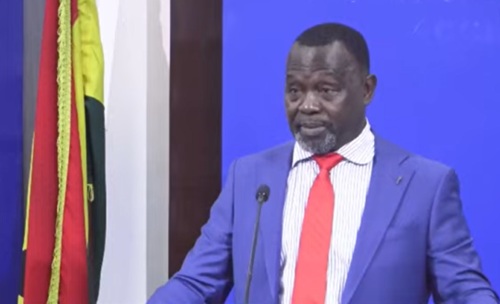The Attorney General and Minister of Justice, Honourable Dr. Dominic Akuritinga Ayine, has provided detailed justifications for his decision to drop criminal charges in several high-profile cases, including those involving former government officials from the National Democratic Congress (NDC).
Speaking at a press conference today in Accra, Dr. Ayine emphasized that his decisions were guided by ethical considerations, legal principles, and a commitment to fairness and transparency.
Key reasons for discontinuing cases
Dr. Ayine outlined three primary reasons for his decision to discontinue certain prosecutions:
1. Ethical and professional considerations: Dr. Ayine explained that he could not, in good conscience, continue prosecuting cases in which he had previously been involved as a defense lawyer. Specifically, he cited the cases of Republic v. Cassiel Ato Forson & Another and Republic v. Ofosu Ampofo & Another, where he had previously represented the accused. He maintained that these cases were politically motivated and lacked merit, a position he had held even before assuming office as Attorney General.
2. Defective charges: The Attorney General highlighted that some charges were fundamentally flawed and lacked the precision required under criminal law. For instance, in the case of Republic v. Collins Dauda & Others, the prosecution failed to account for the value of the Saglemi housing project, which was constructed using part of the funds in question. This oversight rendered the charges defective, as the accused could not be properly informed of the nature of the allegations against them.
3. Insufficient evidence: Dr. Ayine noted that in several cases, the evidence presented by the prosecution was insufficient to secure a conviction. He cited the case of Republic v. Stephen Opuni & Another, where the prosecution failed to call any farmers to testify about the efficacy of the Lithovit fertilizer, despite claims that it was ineffective. Instead, evidence from COCOBOD officials and farmers indicated that the fertilizer was effective and preferred by farmers. This lack of evidence, coupled with procedural irregularities, led Dr. Ayine to conclude that continuing the prosecution would be unjust.
Judicial conduct and fair trial concerns
Dr. Ayine also expressed concerns about the conduct of some judges in the cases he reviewed. He criticized the actions of Justice Honyenuga in the Opuni case, where exculpatory evidence was expunged from the record, and the judge ruled that the accused had a case to answer despite significant doubts about the prosecution’s case. He also raised concerns about the executive branch’s interference, including the promotion of judges presiding over certain cases, which could create perceptions of bias.
Transparency and accountability
In a departure from traditional practices, Dr. Ayine emphasized the importance of transparency in prosecutorial decisions. He referenced a Supreme Court ruling in Gregory Afoko v. Attorney General, which highlighted the need for prosecutorial authorities to be open about the factors influencing their decisions. Dr. Ayine stated that his decision to explain his actions was not only to avoid accusations of partiality but also to comply with constitutional requirements under Article 296 of the Constitution, which mandates fairness and reasonableness in the exercise of discretionary powers.
Dr. Ayine concluded by affirming that his decisions were made in the best interest of justice and the rule of law. He stressed that his actions were not influenced by political pressure or instructions from the President. He also clarified that none of the individuals affected by his decisions had been accused of looting state resources, distinguishing between the offense of causing financial loss and more serious crimes like bribery and corruption.

